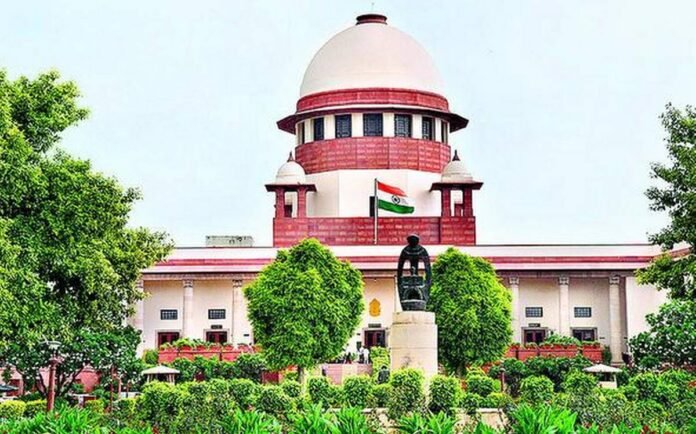[ad_1]
SUPREME COURT CLARIFIES: ENTIRE APPEAL WILL ABATE IF LEGAL HEIRS OF DECEASED PARTY IN A JOINT DECREE ARE NOT SUBSTITUTED IN TIME

INTRODUCTION
In a significant pronouncement on July 18, 2025, the Supreme Court of India, in the case of Suresh Chandra (Dead) through LRs Vs Parasram (SLP (C) Nos.15900-15902/2022) (Justices Manoj Mishra and P.N Narsimha) reiterated the consequences of failing to substitute legal representatives in an appeal involving a joint and indivisible decree. The Court held that in such situations, the entire appeal would abate if even one deceased party’s legal heirs are not brought on record within the prescribed time. The Judgment builds on well-settled legal principles and reiterates the need to avoid inconsistent or conflicting decrees when the rights of parties are inextricably linked.
BRIEF FACTS
The case arose from a civil suit instituted in 1983 by a plaintiff named Parasram, seeking declaration of ownership, possession, and mesne profits over a residential property. The Defendants, Suresh Chandra and Ram Babu, denied being tenants and claimed ownership through their father Gokul Prasad, asserting a family partition dating back to 1947.
The Trial Court dismissed the suit. However, on appeal, the First Appellate Court reversed the decision and decreed in favour of the plaintiff. Aggrieved, Suresh Chandra’s Legal Representatives and Ram Babu filed a second appeal.
During the pendency of the second appeal, Ram Babu died in 2015, but his legal representatives were not brought on record. In 2022, the High Court declared the entire appeal abated due to this non-substitution. The Defendants then approached the Supreme Court.
ISSUES OF LAW
- Whether an appeal would abate entirely upon the failure to substitute the legal heirs of one deceased appellant in a joint and indivisible decree.
- Whether proceedings can continue in such a case against surviving appellants alone without causing inconsistent or conflicting decrees.
REASONING OF THE COURT AND THE JUDGMENT
The Supreme Court upheld the High Court’s ruling and dismissed the Appeal. Justice Manoj Misra, writing for the Bench, held that since the decree of the First Appellate Court was joint and inseverable — being against both Defendants who had taken a unified stand — the failure to substitute Ram Babu’s legal representatives led to complete abatement.
The Court emphasized the potential for conflicting decrees if an appeal proceeds only against surviving parties in joint claims. It reiterated that the abatement of a party in such scenarios is fatal to the entire appeal, as partial adjudication could undermine the integrity of the judicial process.
Citing the Constitutional Bench Judgment in Sardar Amarjit Singh Kalra (Dead) by LRs & Ors. v. Smt. Pramod Gupta (Dead) by LRs & Ors., (2003) 3 SCC 272, the Court reaffirmed that in case of a ‘joint and indivisible decree’, the abatement of proceedings in relation to one or more of the appellants or respondents due to non-substitution would prove fatal to the entire appeal and require it to be dismissed in toto, as otherwise inconsistent or contradictory decrees would result.
KEY LEGAL PRINCIPLES SUMMARIZED BY THE COURT
- Case-by-case determination: Whether abatement is partial or total depends on the facts.
- Risk of inconsistent decrees: If continuation of the appeal may lead to contradictory outcomes, courts will not permit it.
- Joint and inseverable decrees: Abatement of even one party’s appeal will cause entire appeal to abate.
- Test for inconsistency: Decrees are inconsistent if enforcement of one negates the other.
- Independent rights: If parties’ rights are distinct and severable, abatement may be partial.
- Substance over form: Nature of the decree — not merely the jointness of claims — will determine in severability.
ANALYSIS
The ruling offers important clarity on procedural rigour and substantive justice in appellate litigation involving multiple parties. It underscores the responsibility of Appellants to ensure timely substitution of legal heirs — a lapse that can irretrievably damage their case. More critically, the Judgment aligns with judicial consistency, preventing fragmentary outcomes in interconnected disputes.
This case reiterates that where parties are co-claimants or co-defendants with a common cause, any lapse affecting one resonates across the entire appeal. The Supreme Court’s emphasis on avoiding contradictory decrees is not just doctrinal but practical, ensuring predictability and fairness in civil procedure.
CONCLUSION
The Supreme Court’s decision reinforces a cardinal rule in civil appellate practice: when a decree is joint and inseparable, failure to timely substitute legal representatives of a deceased party will result in the entire appeal abating. The ruling is a crucial reminder for litigants and lawyers alike — procedural lapses can lead to substantive forfeitures. Ensuring diligent compliance with procedural norms is indispensable to preserving legal remedies, especially in complex multi-party litigation.
SARTHAK KALRA
Senior Legal Associate
The Indian Lawyer & Allied Services
Please log onto our YouTube channel, The Indian Lawyer Legal Tips, to learn about various aspects of the law. Our latest Video, titled “What Is Waqf? Legal Meaning, Rights & Key Judgments in India” | Advocate Sushila Ram Varma| Advocate Sushila Ram Varma| can be viewed at the link below:
https://www.youtube.com/watch?v=NKJgw5k4kQU
[ad_2]
Source link

